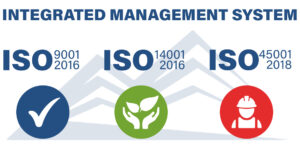JASANZ Certification (or Accreditation): How To Guide
JASANZ Certification Explained
JASANZ Certification can be a requirement for many tenders and contracts (especially for large companies or government works). These certifications can include:
- AS/NZS ISO 45001 Safety Management Systems,
- AS/NZS ISO 9001 Quality Management Systems, and
- AS/NZS ISO 14001 Environmental Management Systems.

The process can seem complicated and daunting, however investing in these systems can be vital for many organisations to “break into” these more lucrative markets.
The terms “JASANZ Certification” and “JASANZ Accreditation” are used interchangeable.
JASANZ Certification vs ISO Certification
Normally, people talk about getting “ISO Certified” – however this is slang (even our consultants call it ISO Certification!). ISO and JASANZ are best described as:
- ISO refers to the organisation that publishes the standards (e.g. they wrote the standards AS/NZS ISO 45001, 14001 and 9001 – and many others).
- JASANZ stands for the Joint Accreditation System of Australia and New Zealand. They are the accreditation body that grants certification.
When people say, “ISO Certification” they are normally referring to “JASANZ Certification” (or accreditation).
Are There Different Types of Certification?
Yes. But be careful when using other types of certifications as these typically don’t hold as much weight as true JASANZ certification.
One example is Exemplar Certification. This is a certification granted by an auditor who is registered with Exemplar Global. This can be useful in some circumstances. However, be sure to check with your client what type of certification they require, as often they will require true JASANZ Certification.
How Does My Business Get JASANZ Certification?
We have an in-depth guide on how to get certified here:
What is ISO 45001 Certification and How Do I Get Certified?
The overall process is described below.

* With yearly surveillance audits and 3-yearly re-certification audits.
How Much Does It Cost?
Costs can usually be broken down into 2 parts:
- Cost for system development, implementation and consultation (usually $7,000 – $15,000)
- Cost for third-party audit and certification (usually $5,000 – $15,000)
Costs vary depending on:
- The industry you work in (high risk industries typically cost more to certify)
- Number of staff (FTE)
- Numbers of sites / facilities
- Which certifications you want (e.g. just 45001, or 45001 + 9001 + 14001)
Typically, small and medium-sized businesses can expect to pay anywhere from $12,000 to $25,000 for the entire process.
What is the Audit Process?
The audits may sound scary, but they are usually the easy bit. We tell our clients that the hard bit is getting ready for audit. Before the audit, we work with clients to ensure the system is compliant and that documentation and records are in place to help the auditor collect the evidence they need.
Audit time is when you can sit back and admire the system! There are always corrective actions that need to be closed out, however usually they are minor.
Did You Know?
The Joint Accreditation System of Australia and New Zealand (JASANZ) was established on October 30, 1991, through a historic treaty between Australia and New Zealand. This made JASANZ the first trans-Tasman institution of its kind, aimed at strengthening the trading relationship between the two countries.
Initially focused on quality management systems, JASANZ has since expanded its accreditation services to cover a wide range of sectors, including health, environment, and product certification.
FAQs
What is JASANZ?
JASANZ stands for the Joint Accreditation System of Australia and New Zealand. It is an independent, non-profit organization that provides accreditation / certification.
Why is JASANZ Certification important?
Certification (or accreditation) by JASANZ enhances trust and credibility in the market, providing assurance that products, services, and systems meet specified standards.
Which sectors does JASANZ cover?
JASANZ covers a wide range of sectors, including:
- Business and Innovation
- Environment and Sustainability
- Food and Biological Systems
- Health and Human Services
- Product Certification
What are the benefits of JASANZ Certification?
Accreditation provides several benefits, including:
- Enhanced market trust and credibility
- Competitive advantage
- International recognition and acceptance
- Improved quality and safety standards
How long does the process take?
Minimum of 2 – 3 months. The duration of the accreditation process can vary depending on the complexity of the business. It typically involves several months from initial application to final accreditation.
Can JASANZ Certification be revoked?
Yes, JASANZ can revoke accreditation if a business fails to maintain compliance with the required standards or fails to address non-conformities identified during surveillance visits.
Articles and Further Reading
- Our History (JASANZ) <https://www.jasanz.org/our-history>
- Joint Accreditation System of Australia and New Zealand (Wikipedia) <https://en.wikipedia.org/wiki/Joint_Accreditation_System_of_Australia_and_New_Zealand>
- What is a WHSMS (Work Health and Safety Management System)? (Spire Safety) <https://spiresafety.com.au/resources/what-is-a-whsms/>
